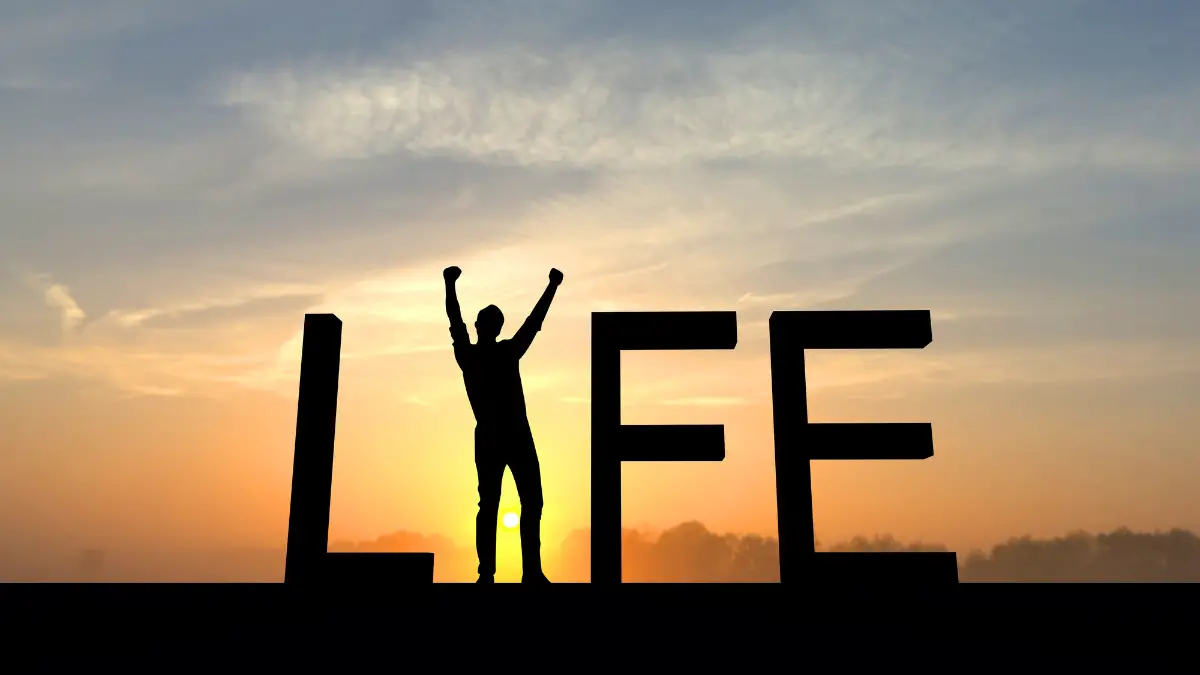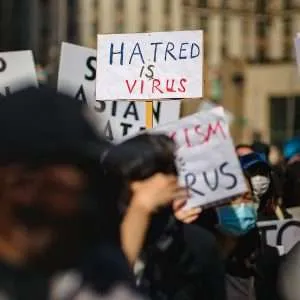Editorial Note
Thank you to our generous sponsors, Sociologists for Women in Society, Center for Equity Education, American Sociological Association’s Section on Sociological Practice & Public Sociology, Hartman Castle Preservation Corporation, Island Acres Resort Motel, Alpha Kappa Delta, Pacific Sociological Association, and the Association for Applied & Clinical Sociology for helping us make Applied Worldwide’s 2024 “Why is Sociology Important?” student essay competition a success!
This essay on the importance of sociology has been published on behalf of Applied Worldwide’s 2024 Global Student Essay Competition. For the 2024 competition, we awarded 16 student essayists across six countries and will be sharing each winning essay in our “Why is Sociology Important?” essay collection.
This sociology essay was written by Kritika Banerjee, a 3rd year BA Honors Sociology student from Indraprastha College for Women, University of Delhi in India and earned a 3rd place prize in the competition.
Sociology: It is not just limited to classrooms, IT IS LIFE! Kritika Banerjee
I have been singing since the age of 9, and music has always been an integral part of my life. But whenever the question “What would you become when you grow up?” came up, music was never considered a legit one. Many still view it as a hobby. But things changed when I had to work on a two-year research project in the 11th and 12th grade for my sociology board practical. Initially, I was confused about what intrigues me to such an extent that I can research it for a long duration with enthusiasm. So, my sociology teacher suggested I combine both music and sociology. Being the music coordinator at high school, teachers knew my passion for music. Of course, I was confused at first because both of them seemed poles apart to me, but after having a conversation with my teacher, I realised how music not only shapes musical notes. It helps in the formation of human identities as well. Thus, the first research of my life was on music’s impact on the social lives of people, and sociology provided me with a space to reconnect with my passion!
Helping in understanding the different facets of reality, sociology has been eye-opening for me in many ways. I was bullied by some of my peers at school for being a little chubby when I was a kid. Back then, I was scared to put forward my problems openly, but after engaging with the discipline, I learned more about how body standards are set and encouraged in our society. So, sociology has not only taught me to voice out my opinions and concerns but also helped me realise how we, as humans, love categorising people and things. This is similar to what Berger and Luckmann focus on when they say the reality of everyday life contains ‘typificatory schemes’.
Moving on, sociology also helped me realise that these problems of mine were not just personal trouble but, as C. Wright Mills would emphasize a public issue as well. For instance, I tried avoiding food after the bullying incident, but later I realized that food insecurities and bullying had larger societal consequences. I was not the only one facing trouble due to chubbiness. Thus, there is stigma associated with obesity, pointing to the need for greater awareness and sensitivity regarding such issues. We always think that our immediate surroundings are all that matters and are the basis of our existence. Failing to understand that individuals, society, and the changes taking place in them are interconnected. Thus, I am grateful to my college professors (former faculty of the Department of Sociology, IPCW) who made sociology seem relatable and fun by introducing thinkers like C. Wright Mills and Allan Johnson in the beginning without bombarding us, the students, with the big theories at one go.
Another thinker whose work has always fascinated me is Erving Goffman. His way of looking at the world as a theatre and people as actors took me back to the time when the pandemic had brought everything to a halt. People were confined to the four walls of their homes, and there was a blurring of both ‘front stage’ and ‘back stage’. The former behavior takes place when people know they are being watched, and it reflects the internalized norms and expectations of one’s behavior. The latter takes place when an individual is free of the expectations and norms that dictate front-stage behavior. For instance, I had to wear the school uniform along with my ID card and write exams in my room over a zoom call. Something that I would usually not wear or do at home.
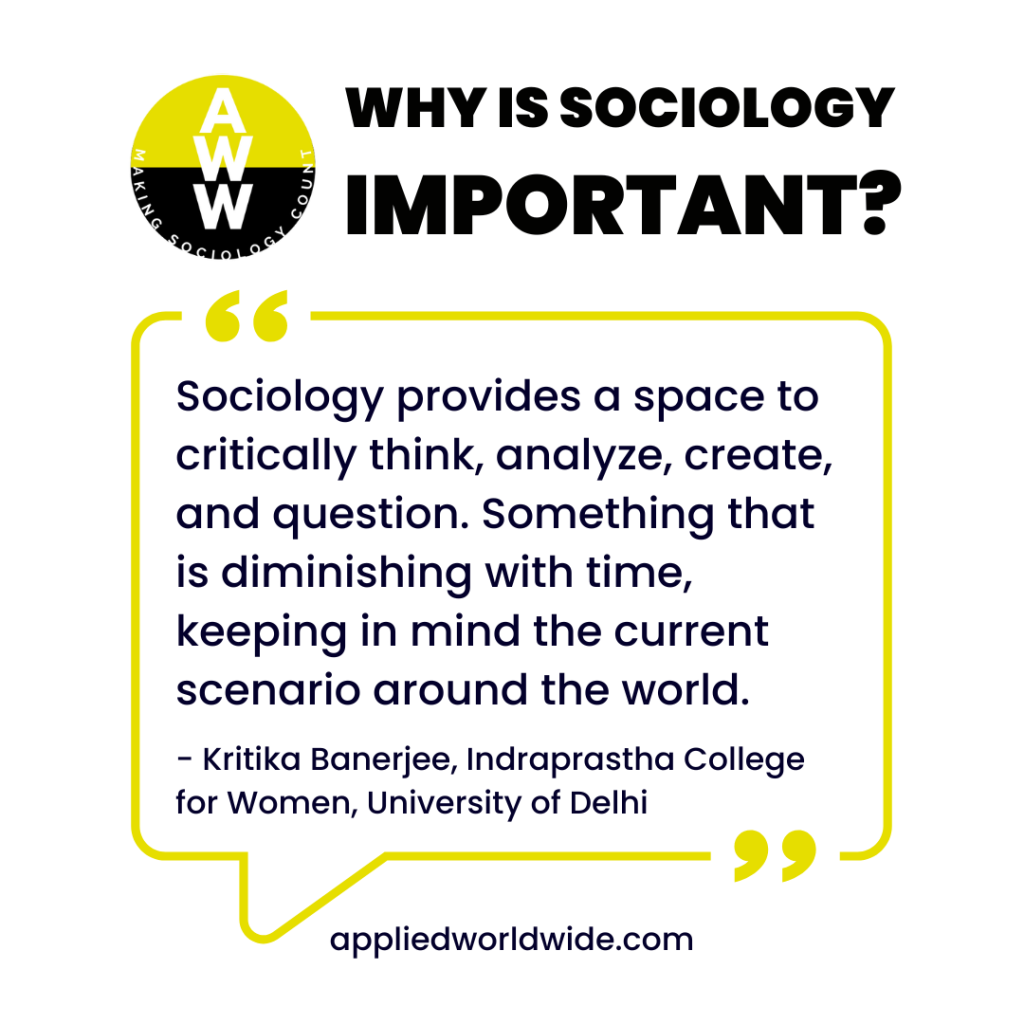
Interestingly, the pandemic also highlighted how there are hidden patterns around us, even in households! Looking at the family dynamics, I never really questioned why my friend’s mother would not eat her meals before serving everyone else or why most houses have chairs fixed at the dining table according to one’s seniority. As these were ‘obvious’ normative behavior. But the visibility of such ‘imposed patterns’ became more clearer with the knowledge that this discipline has introduced me to. Thus, sociology provides a space to critically think, analyze, create, and question. Something that is diminishing with time, keeping in mind the current scenario around the world. One of which is the removal of sociology as an educational course in Florida. Of course, such one-dimensionalism isn’t new. It goes back to the work of Herbert Marcuse, who emphasized how the oppressive forces of contemporary society, like technocracy, capitalism, mass media, and the state, had become instruments of domination.
Coming to how sociology has been a home away from home, I believe my association with sociology has given me a new sense of ‘belongingness.’ Last summer, during an internship, some of my teammates wanted me to perform witchcraft and hypnotize our supervisor so that she demanded less work out of us. Without much thought, they associated my identity with black magic, as I am a Bengali and Bengalis are believed to have powers to perform such rituals. But this is not the first time that I have dealt with such stereotypical remarks. I have been facing similar labeling since school days. Hence, I feel sociology has always been welcoming and comforting to my soul. It has introduced me to like-minded people who never carried such preconceived notions about me or my community. Rather, it has provided me with a space where I can be myself freely and speak my heart out without the pressure of being judged or misunderstood.
Of course, life has not been the same ever since I became a sociology student. Being ‘extra’ aware of the world we live in is gut-wrenching. It did get difficult to agree with people at all times. But I believe that sociology also teaches an individual to hold firm ground while respecting other’s opinions, emphasizing the importance of ‘selfhood’ and ‘others.’ So, it is interesting to see how sociology not only focuses on the macro, but the micro aspects of life as well. From gender, stratification, and kinship to the political, economic, and religious sectors, it resides in the mundanity of our everyday lives. I don’t think one can ever confine or draw rigid boundaries around this discipline. Its vastness knows no boundary!
Since my childhood days, I have seen my grandfather present research papers and deliver lectures in his own field (Geology). Since then, I have had a dream of writing a research paper. But it was only after I entered college that I came face-to-face with the intricacies of research work. But the passion and dedication with which my professors taught sociology made me fall in love with the discipline even more. And this love then led me to work on my childhood dream. Currently, I have written as well as presented my research paper(s) across colleges and universities. I even had my first academic flight, for a paper presentation competition outside Delhi, in February 2024! In this journey, the Sociological Research Methods course within the discipline has also helped me immensely in understanding field dynamics in an in-depth manner. As graduation nears, I am imagining how my 10-year-old self would react to my 21-year-old self. A lot has changed, but I guess the zeal in me to continue working for the better has only enhanced with time. Sociology made me learn, re-learn, and unlearn many things, but only for the better. thus, It not only opens a door to creativity and opportunities but also towards self-development and self-consciousness.
Sociology made me learn, re-learn, and unlearn many things, but only for the better. thus, It not only opens a door to creativity and opportunities but also towards self-development and self-consciousness.
My concluding thoughts on ‘why sociology is important’ revolve around how it has the ability to cater to every problem in a meaningful manner as well as study human realities, keeping away one’s biases. I believe this course should be introduced to students at a younger level rather than taught to senior students only. I wish I was introduced to sociology much earlier in life, as it offers a diverse approach towards contemporary issues and tickles an individual’s grey cells to a great extent. Thus proving to be helpful in many ways. For me personally, this discipline never seemed like any other course on the syllabus. It always appeared as a ray of hope amidst the everyday hustle. And as I delved deeper into it, reading and engaging with texts by Emile Durkheim, Max Weber, Karl Marx, G.H.Mead, M.N.Srinivas, Iravati Karve, and Janet Carsten made learning fun. Lastly, I believe sociology advocates diversity and inclusivity, bringing together communities from all walks of life, offering representation, and creating an informed understanding of the world. Thus, it is not just limited to the four walls of a classroom. It is life!
Meet our 2024 Global Student Essay Competition Sponsors!
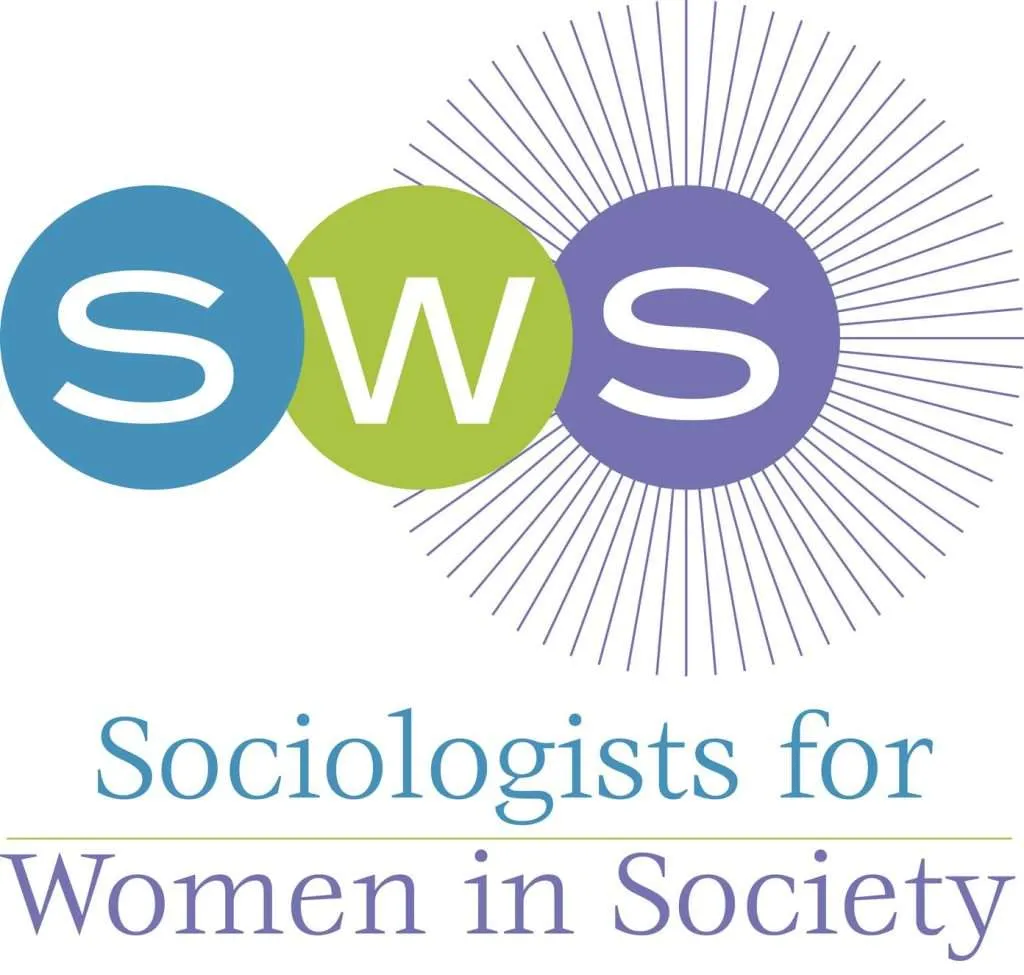
Sociologists for Women in Society is a nonprofit professional feminist organization dedicated to:
- Transforming the academy and professional organizations, including our own, by actively supporting feminist leadership and advancing career development of feminist scholars.
- Recognizing that structural inequalities impact those marginalized by their identities and that this requires proactively promoting the creation of inclusive institutional spaces in an ongoing manner and by practicing critical reflexivity.
- Advocating and encouraging the development of sociological feminist theory rooted in intersectionality and cutting-edge research for publication and dissemination.
- Promoting social justice research within local, national, and international activist spaces by supporting scholar-activist communities seeking to dismantle intersecting systems of oppression.

The Center for Equity Education (CFEE), established in 2020 as a 501(c)(3) nonprofit, addresses a gap in expert-led education for organizations, especially those with limited resources. At CFEE, our mission revolves around empowering organizations with comprehensive knowledge on federal and state civil rights, specializing in harassment and discrimination, including sexual harassment.
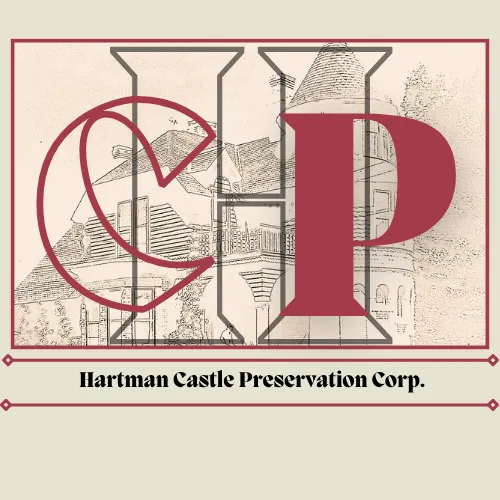
Hartman Castle Preservation Corporation, a 501c3 non-profit, is a A community grassroots movement formed to purchase and preserve the Hartman Castle in Gunnison, CO

The purpose of the American Sociological Association’s Section on Sociological Practice and Public Sociology is to advance sociologically-informed research and practice, to further public discussion of sociological issues, and to promote the use of sociology to inform public policy.

Island Acres Resort Motel is a restored authentic 1950s lodging property in the style of the tourist court motel. Embracing the appeal of a bygone era, where history blends with hospitality.

Alpha Kappa Delta, the International Sociology Honor Society, seeks to acknowledge and promote excellence in the scholarship in the study of social problems, sociology, and intellectual activities that lead to the improvement in the human condition.
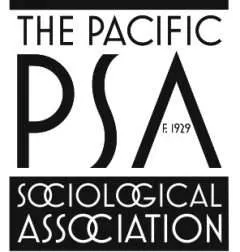
The Pacific Sociological Association is committed to serving sociologists, faculty, applied professionals, and students. We strive to create a professional community that reflects the diversity of our region and enhances the diversity of our discipline. We are committed to inclusivity and equity in our organization, to promoting social justice by examining and challenging the structural and institutional barriers in our discipline, and to building pathways for the next generation of sociologists.

The Association for Applied and Clinical Sociology (AACS) promotes applying social scientific knowledge and methods to develop constructive solutions. We provide educational, programmatic, mentoring, networking, and policy resources in a supportive professional community.

